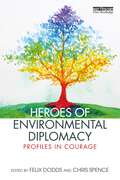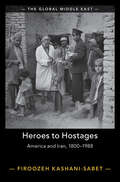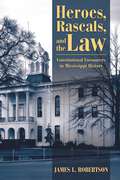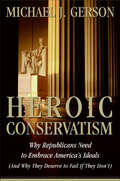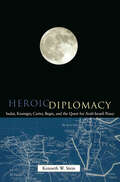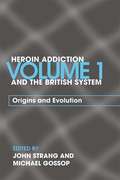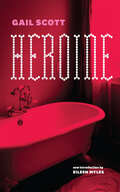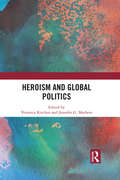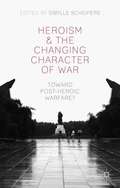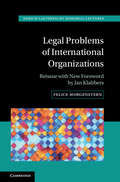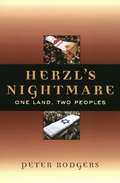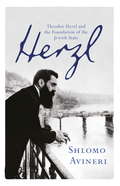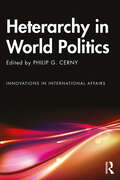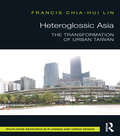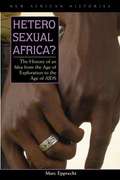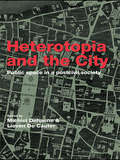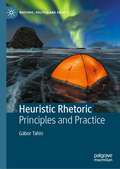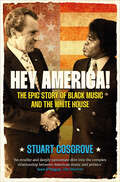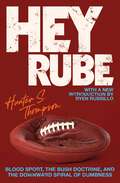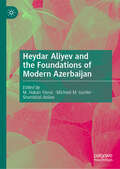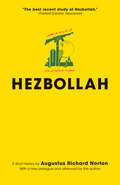- Table View
- List View
Heroes for Civil Rights
by David A. Adler Bill FarnsworthDr. Martin Luther King, Jr. , civil rights leader. Fannie Lou Hamer, founder of the Mississippi Freedom Democratic Party. The Little Rock Nine, pioneers in social integration. Whether marching, speaking, or simply going to school, these brave men and women fought to advance social justice. David A. Adler's moving biographies and Bill Farnsworth's evocative paintings honor these Americans who risked their own lives so that others could enjoy their rights.
Heroes of Environmental Diplomacy: Profiles in Courage
by Felix DoddsToday more than ever, when the world is beset by environmental, social, healthcare and economic challenges, we need courage in our politics, both nationally and globally. This book tells the stories, some for the first time, of twelve individuals who made heroic contributions to protecting our planet through ground-breaking international treaties. Can individuals change the world? Today, when impersonal forces and new technologies seem to be directing our lives and even our entire planet in ways we cannot control, this question feels more relevant than ever before. This book argues that we can all make a difference. It tells inspiring stories of individuals who have had a global impact that is beyond dispute, as well as others who have brought about change that is understated or hard to measure, where the scale of the impact will only become clear in years to come. While some are scientists, others are politicians, diplomats, activists, and even businesspeople. However, they all share the qualities of perseverance, patience, a willingness to innovate or try new approaches, and the endurance to continue over years, even decades, to pursue their goal. Drawing on interviews and the inside stories of those involved, each chapter follows one or more of these heroic individuals, a list which includes Luc Hoffmann, Mostafa Tolba, Maria Luiza Ribeiro Viotti, Raul Oyuela Estrada, Barack Obama and Paula Caballero. Presenting an uplifting and gripping narrative, this book is an invaluable resource for students, scholars, activists and professionals who are seeking to understand how consensus is reached in these global meetings and how individuals can have a genuine impact on preserving our planet and reinforcing the positive message that global cooperation can actually work.
Heroes to Hostages: America and Iran, 1800–1988 (The Global Middle East)
by Firoozeh Kashani-SabetIt is easy to forget, given the oppositional dynamic between Iran and the United States of the last 50 years, that these two countries once shared productive partnership. Tracing US-Iran relations over two turbulent centuries, Firoozeh Kashani-Sabet considers when and how this relationship went awry. With careful attention to social and cultural as well as diplomatic developments, Kashani-Sabet shows that the rift did not originate in flashpoints of crisis, like the 1953 coup or the 1979 Islamic Revolution, but was instead long in the making. Drawing from a wealth of English and Persian-language sources, many of which were previously unavailable or unacknowledged, this book considers the relationship from the vantage point of Iranian society and the experiences of an evolving Iran that strived to accommodate American and great power politics. Following these two nations through wars, decolonization, and revolution, Kashani-Sabet presents an invaluable history of a diplomatic rivalry that informs geopolitics to this day.
Heroes, Rascals, and the Law: Constitutional Encounters in Mississippi History
by James L. RobertsonJames L. Robertson focuses on folk encountering their constitutions and laws, in their courthouses and country stores, and in their daily lives, animating otherwise dry and inaccessible parchments. Robertson begins at statehood and continues through war and depression, well into the 1940s. He tells of slaves petitioning for freedom, populist sentiments fueling abnegation of the rule of law, the state’s many schemes for enticing Yankee capital to lift a people from poverty, and its sometimes tragic, always colorful romance with whiskey after the demise of national Prohibition. Each story is sprinkled with fascinating but heretofore unearthed facts and circumstances.Robertson delves into the prejudices and practices of the times, local landscapes, and daily life and its dependence on our social compact. He offers the unique perspective of a judge, lawyer, scholar, and history buff, each role having tempered the lessons of the others. He focuses on a people, enriching encounters most know little about. Tales of understanding and humanity covering 130 years of heroes, rascals, and ordinary folk—with a bundle of engaging surprises—leave the reader pretty sure there’s nothing quite like Mississippi history told by a sage observer.
Heroic Conservatism: Why Republicans Need to Embrace America's Ideals
by Michael J. GersonMichael Gerson, who worked with George W. Bush on his most inspiring speeches, is considered by many Democrats and Republicans to be the most influential White House speechwriter since the Kennedy administration. He was also more than a speechwriter, he was a trusted insider who helped shape policy.In Heroic Conservatism Gerson uses his own experiences in the upper tier of the Bush White House to show why America needs a conservatism that is heroic in its aspirations—including "compassionate conservative" proposals to confront global AIDS, combat poverty in America, and promote human rights and dignity abroad—initiatives that Gerson fought for during his time in government.Gerson has a unique ability to frame complex issues in a way that both challenges and inspires, and in Heroic Conservatism he delivers a new manifesto for the Republican Party and a fascinating memoir of a history-shaping Presidency.
Heroic Diplomacy: Sadat, Kissinger, Carter, Begin and the Quest for Arab-Israeli Peace
by Kenneth W. SteinFirst published in 1999. Routledge is an imprint of Taylor & Francis, an informa company.
Heroin Addiction and The British System: Volume I Origins and Evolution
by John Strang Michael GossopThe British system of dealing with drug addiction is notable for its flexibility and its capacity to adapt to changing circumstances. Because of this it has attracted considerable international interest, although it is rarely fully understood or accurately represented.Presenting a comprehensive account of the development of policies and treatments, Heroin Addiction brings together the perspectives of policy makers, practitioners and social commentators. The book contributes to a proper understanding of how policy and practice has evolved so that lessons for future policy and practice may be identified.Volume II of Heroin Addiction charts the development and use of treatment and policy responses in the UK, highlighting the limitations of these approaches as well as their achievements. It is a unique source of reference for students, researchers, healthcare professionals and drug agencies both in the UK and overseas.
Heroin Addiction and The British System: Volume II Treatment & Policy Responses
by John Strang Michael GossopThe British system of dealing with drug addiction is notable for its flexibility and its capacity to adapt to changing circumstances. Because of this it has attracted considerable international interest, although it is rarely fully understood or accurately represented.Presenting a comprehensive account of the development of policies and treatments, Heroin Addiction brings together the perspectives of policy makers, practitioners and social commentators. The book contributes to a proper understanding of how policy and practice has evolved so that lessons for future policy and practice may be identified.Volume II of Heroin Addiction charts the development and use of treatment and policy responses in the UK, highlighting the limitations of these approaches as well as their achievements. It is a unique source of reference for students, researchers, healthcare professionals and drug agencies both in the UK and overseas.
Heroine
by Gail ScottIn a bathtub in a rooming house in Montreal in 1980, a woman tries to imagine a new life for herself: a life after a passionate affair with a man while falling for a woman, a life that makes sense after her deep involvement in far left politics during the turbulent seventies of Quebec, a life whose form she knows can only be grasped as she speaks it. A new, revised edition of a seminal work of edgy, experimental feminism. With a foreword by Eileen Myles.
Heroine
by Gail ScottIn a bathtub in a rooming house in Montreal in 1980, a woman tries to imagine a new life for herself: a life after a passionate affair with a man while falling for a woman, a life that makes sense after her deep involvement in far left politics during the turbulent seventies of Quebec, a life whose form she knows can only be grasped as she speaks it. A new, revised edition of a seminal work of edgy, experimental feminism. With a foreword by Eileen Myles.
Heroism and Global Politics
by Veronica Kitchen Jennifer G. MathersThe rhetoric of heroism pervades politics. Political leaders invoke their own heroic credentials, soldiers are celebrated at sporting events, ordinary citizens become state symbols (or symbols of opposition), and high profile celebrities embody a glamorized, humanitarian heroism. Using analytical tools drawn from international relations, gender studies, war studies, history, and comparative politics, this book examines the cultural and political phenomenon of heroism and its relationship to the process of creating, sustaining and challenging political communities. Arguing that heroism is socially constructed and relational, the contributors demonstrate that heroes and heroic narratives always serve particular interests in the ways that they create and uphold certain images of states and other political communities. Studying the heroes that have been sanctioned by a community tells us important things about that community, including how it sees itself, its values and its pressing needs at a particular moment. Conversely, understanding those who are presented in opposition to heroes (victims, demonized opponents), or who become the heroes of resistance movements, can also tell us a great deal about the politics of a state or a regime. Heroes are at once the institutionalization of political power, and yet amorphous--one can go from being a hero to a villain in short order. This book will appeal to scholars and students working on topics related to international relations, gender, security and war studies, comparative politics, state building, and political communities.
Heroism and the Changing Character of War
by Sibylle ScheipersPost-heroism is often perceived as one of the main aspects of change in the character of war, a phenomenon prevalent in western societies. According to this view, demographic and cultural changes in the west have severely decreased the tolerance for casualties in war. This edited volume provides a critical examination of this idea.
Hersch Lauterpacht Memorial Lecture Series: Legal Problems of International Organizations (Hersch Lauterpacht Memorial Lectures #Series Number 2)
by Felice MorgensternHerzl's Nightmare: One Land, Two Peoples
by Peter RodgersTheodor Herzl's dream of a national homeland for the Jewish people was realized when Israel declared its independence in 1948. <P><P>Yet it was made possible through the deaths of millions of European Jews and at the expense of Palestinian society--a people who would never forget what they saw as a grave injustice. Herzl's dream would prove illusory. This important new study from the former Australian ambassador to Israel shows how little the dynamics of the conflict have actually changed; how eerily reminiscent today's antagonisms and falsehoods are of yesteryear's; and how much today's self-righteous intransigence--on both sides--owes to what went before.
Herzl: Theodor Herzl and the Foundation of the Jewish State
by Shlomo AvineriThe first biography in more than a generation of the father of modern political Zionism and in effect the state of Israel.Drawing extensively on his diaries as well as his published works, this intellectual biographical follows Herzl's transformation from a private person into the founder and leader of a political movement which made the quest for a Jewish state into a player in international politics. Contrary to the conventional view which saw the Dreyfus affair as the trigger for Herzl's loss of belief in the promise of Jewish emancipation, Avineri shows how it was the political crisis of the Austro-Hungarian Habsburg Empire, torn apart by contending national movements, which convinced Herzl of the need for a Jewish polity.In response to the wide resonance for his 1896 THE JEWISH STATE, Herzl convened the first Zionist Congress in Basel in 1897, which established the World Zionist Organization with its representative and elected institutions; this in turn became the foundation for Israel's democratic political system. In his efforts to gain international support for a Jewish state, Herzl met with the Ottoman Sultan, the German Emperor Wilhelm II, Pope Pius X, British, Russian and German ministers, as well as an enormous number of other government and public opinion leaders of most European countries. By the time of his early death in 1904 at the age of 44, Herzl succeeded in putting Zionism on the map of world politics, no longer an esoteric idea held by a small group of Jewish intellectuals in Eastern Europe.
Heterarchy in World Politics (Innovations in International Affairs)
by Philip G. CernyHeterarchy in World Politics challenges the fundamental framing of international relations and world politics. IR theory has always been dominated by the presumption that world politics is, at its core, a system of states. However, this has always been problematic, challengeable, time-bound, and increasingly anachronistic. In the 21st century, world politics is becoming increasingly multi-nodal and characterized by "heterarchy" – the coexistence and conflict between differently structured micro- and meso quasi-hierarchies that compete and overlap not only across borders but also across economic-financial sectors and social groupings. Thinking about international order in terms of heterarchy is a paradigm shift away from the mainstream "competing paradigms" of realism, liberalism, and constructivism. This book explores how, since the mid-20th century, the dialectic of globalization and fragmentation has caught states and the interstate system in the complex evolutionary process toward heterarchy. These heterarchical institutions and processes are characterized by increasing autonomy and special interest capture. The process of heterarchy empowers strategically situated agents — especially agents with substantial autonomous resources, and in particular economic resources — in multi-nodal competing institutions with overlapping jurisdictions. The result is the decreasing capacity of macro-states to control both domestic and transnational political/economic processes. In this book, the authors demonstrate that this is not a simple breakdown of states and the states system; it is in fact the early stages of a structural evolution of world politics. This book will interest students, scholars and researchers of international relations theory. It will also have significant appeal in the fields of world politics, security studies, war studies, peace studies, global governance studies, political science, political economy, political power studies, and the social sciences more generally.
Heteroglossic Asia: The Transformation of Urban Taiwan
by Francis Chia-Hui LinHeteroglossic Asia presents an analysis of geographic, historical, cultural, economic, spatial and political factors underlying Taiwan’s maritime urbanity by means of case studies based on Taipei and Kaohsiung; two cities which represent the multi-accentual character of Taiwan’s urban environment and its recent changes and development through architecture. Focussing on the concept of a heteroglossic Asia Pacific, exemplified by the analysis of Taiwan’s urban transformation, the study argues that Taiwan’s urban environment shows a form of intended "fuzziness" which cannot be described as resting on either a simplified nationalist base or chaotic societal anxiety. Rather, this form lies between binary poles: autocracy and democracy, nation state and day-to-day life, top-down and bottom-up orientations, orthodoxy and hybridisation.
Heterosexual Africa?: The History Of An Idea From The Age Of Exploration To The Age Of Aids (New African Histories)
by Marc EpprechtHeterosexual Africa? The History of an Idea from the Age of Exploration to the Age of AIDS builds from Marc Epprecht’s previous book, Hungochani (which focuses expli citly on same-sex desire in southern Africa) to explore the historical processes by which a singular, heterosexual identity for Africa was constructed—by anthropologists, ethnopsychologists, colonial officials, African elites, and most recently, health care workers seeking to address the HIV/AIDS pandemic. This is an eloquently written, accessible book, based on a rich and diverse range of sources, that will find enthusiastic audiences in classrooms and in the general public. Epprecht argues that Africans, just like people all over the world, have always had a range of sexualities and sexual identities. Over the course of the last two centuries, however, African societies south of the Sahara have come to be viewed as singularly heterosexual. Epprecht carefully traces the many routes by which this singularity, this heteronormativity, became a dominant culture. A fascinating story that will surely generate lively debate Epprecht makes his project speak to a range of literatures—queer theory, the new imperial history, African social history, queer and women’s studies, and biomedical literature on the HIV/AIDS pandemic. He does this with a light enough hand that his story is not bogged down by endless references to particular debates. Heterosexual Africa? aims to understand an enduring stereotype about Africa and Africans. It asks how Africa came to be defined as a “homosexual-free zone” during the colonial era, and how this idea not only survived the transition to independence but flourished under conditions of globalization and early panicky responses to HIV/AIDS.
Heterotopia and the City: Public Space in a Postcivil Society
by Michiel Dehaene Lieven De CauterHeterotopia, literally meaning ‘other place’, is a rich concept in urban design that describes a space that is on the margins of ordered or civil society, and one that possesses multiple, fragmented or even incompatible meanings. The term has had an impact on architectural and urban theory since it was coined by Foucault in the late 1960s but it has remained a source of confusion and debate since. Heterotopia and the City seeks to clarify this concept and investigates the heterotopias which exist throughout our contemporary world: in museums, theme parks, malls, holiday resorts, gated communities, wellness hotels and festival markets. With theoretical contributions on the concept of heterotopia, including a new translation of Foucault’s influential 1967 text, Of Other Space and essays by well-known scholars, the book comprises a series of critical case studies, from Beaubourg to Bilbao, which probe a range of (post)urban transformations and which redirect the debate on the privatization of public space. Wastelands and terrains vagues are studied in detail in a section on urban activism and transgression and the reader gets a glimpse of the extremes of our dualized, postcivil condition through case studies on Jakarta, Dubai, and Kinshasa. Heterotopia and the City provides a collective effort to reposition heterotopia as a crucial concept for contemporary urban theory. The book will be of interest to all those wishing to understand the city in the emerging postcivil society and post-historical era. Planners, architects, cultural theorists, urbanists and academics will find this a valuable contribution to current critical argument.
Heuristic Rhetoric: Principles and Practice (Rhetoric, Politics and Society)
by Gábor TahinThis book introduces a novel approach to the analysis and practice of persuasive speaking and writing: heuristic rhetoric. The new method has evolved to fulfil the need at universities, government departments, political organisations, business enterprises and other public institutions for a modern practical alternative to classical rhetoric, which is, in the author’s view, no longer capable of giving a complete description of contemporary, predominantly mediatised, forms of public persuasive discourse, whilst other competing disciplines, such as critical discourse analysis or strategic manoeuvring, have not yet produced a set of tools, which have the comprehensive nature and practical orientation of Classical Greek and Roman rhetorical system. The book expounds heuristic rhetoric as an inter-disciplinary method to develop advanced skills of critical and strategic reasoning. Applying a novel set of principles for the strategic analysis of persuasive reasoning in complex rhetorical situations, the method emphasizes preparing and continuously adjusting argumentation according to the demands of unpredictable circumstances.
Hey America!: The Epic Story of Black Music and the White House
by Stuart CosgroveThis is the untold story of black music – its triumph over racism, segregation, undercapitalised record labels, media discrimination and political anxiety – told through the perspective of the most powerful office in the world: from Louis Armstrong's spat with President Eisenhower and Eartha Kitt's stormy encounter with Lady Bird Johnson to James Brown's flirtation with Nixon, Reaganomics and the 'Cop Killer' scandal. Moving, insightful and wide-ranging, Hey America! charts the evolution of sixties soul from the margins of American society to the mainstream, culminating in the rise of urban hip-hop and the dramatic stand-off between Donald Trump and the Black Lives Matter movement.
Hey Rube: Blood Sport, the Bush Doctrine, and the Downward S
by Hunter S. ThompsonSports, politics, and sex collide in Hunter S. Thompson's wildly popular ESPN.com columns. From the author of Fear and Loathing in Las Vegas and father of "Gonzo" journalism comes Hey Rube.Insightful, incendiary, outrageously brilliant, such was the man who galvanized American journalism with his radical ideas and gonzo tactics. For over half a century, Hunter S. Thompson devastated his readers with his acerbic wit and uncanny grasp of politics and history. His reign as "The Unabomber of contemporary letters" (Time) is more legendary than ever with Hey Rube. Fear, greed, and action abound in this hilarious, thought-provoking compilation as Thompson doles out searing indictments and uproarious rants while providing commentary on politics, sex, and sports--at times all in the same column. With an enlightening foreword by ESPN executive editor John Walsh, critics' favorites, and never-before-published columns, Hey Rube follows Thompson through the beginning of the new century, revealing his queasiness over the 2000 election ("rigged and fixed from the start"); his take on professional sports (to improve Major League Baseball "eliminate the pitcher"); and his myriad controversial opinions and brutally honest observations on issues plaguing America-including the Bush administration and the inequities within the American judicial system. Hey Rube gives us a lasting look at the gonzo journalist in his most organic form-unbridled, astute, and irreverent.
Hey Rube: Modern History from the Sports Desk
by Hunter S. ThompsonSPORTS, POLITICS, AND SEX COLLIDE IN HUNTER S. THOMPSON'S WILDLY POPULAR ESPN.COM COLUMNS. Insightful, incendiary, outrageously brilliant, such was the man who galvanized American journalism with his radical ideas and gonzo tactics. For over half a century, Hunter S. Thompson devastated his readers with his acerbic wit and uncanny grasp of politics and history. His reign as "The Unabomber of contemporary letters" (Time) is more legendary than ever with Hey Rube. Fear, greed, and action abound in this hilarious, thought-provoking compilation as Thompson doles out searing indictments and uproarious rants while providing commentary on politics, sex, and sports -- at times all in the same column. With an enlightening foreword by ESPN executive editor John Walsh, critics' favorites, and never-before-published columns, Hey Rube follows Thompson through the beginning of the new century, revealing his queasiness over the 2000 election ("rigged and fixed from the start"); his take on professional sports (to improve Major League Baseball "eliminate the pitcher"); and his myriad controversial opinions and brutally honest observations on issues plaguing America -- including the Bush administration and the inequities within the American judicial system. Hey Rube gives us a lasting look at the gonzo journalist in his most organic form -- unbridled, astute, and irreverent.
Heydar Aliyev and the Foundations of Modern Azerbaijan
by Michael M. Gunter M. Hakan Yavuz Shamkhal AbilovThis edited book examines and analyses Heydar Aliyev, the architect and founder of modern, post-Soviet Azerbaijan. The editors of the volume discuss developments between 1993 and 2003 – a decade that saw the establishment of the institutional foundations of the current republic, the adoption of a new form of national identity, the redefinition of the concept of the Azerbaijani state, and the creation of a security establishment designed to gain control of territories Armenia had held since the 1988-1994 war over Karabakh. The book explains why this fateful period had far-reaching consequences for Azerbaijan as a fully formed state and society, as well as major implications for its political future and its geopolitical strategy.
Hezbollah
by Augustus Richard NortonMost policymakers in the United States and Israel have it wrong: Hezbollah isn't a simple terrorist organization--nor is it likely to disappear any time soon. Following Israel's war against Hezbollah in the summer of 2006, the Shi'i group--a hybrid of militia, political party, and social services and public works provider--remains very popular in the Middle East. After Lebanon tottered close to disaster, Hezbollah and its allies gained renewed political power in Beirut. The most lucid, informed, and balanced analysis of the group yet written, Hezbollah is essential reading for anyone who wants to understand the Middle East. A new afterword brings readers up to date on Hezbollah's most recent actions.

